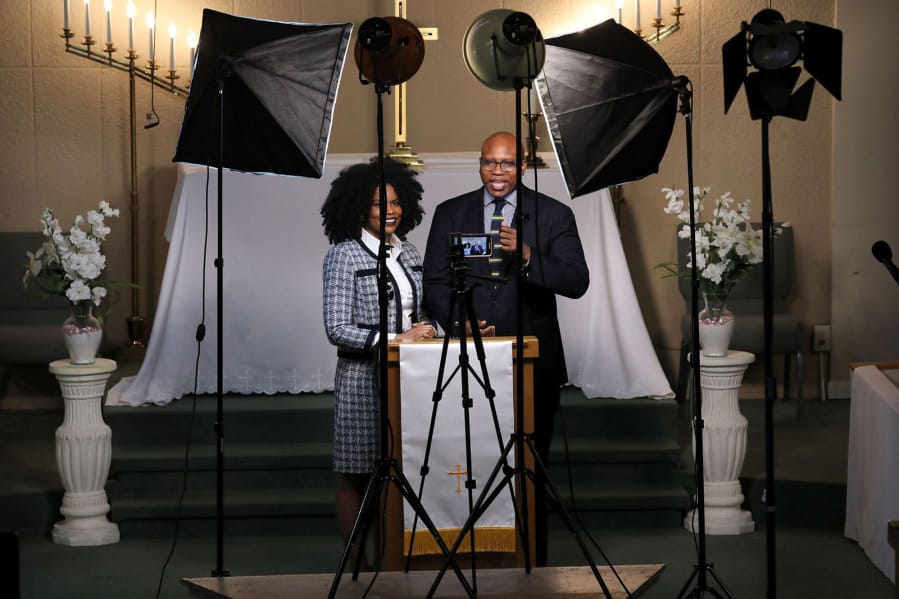CHICAGO — He was scared and had good reason to be. He was over age 60. He had health issues. And the global COVID-19 death toll was mounting.
So, as the Rev. Walter Johnson Jr. lay in the hospital bed, isolated from his family for two weeks, the doubt began to creep in. Being infected with the novel coronavirus pushed a man who has been devoted to ministry since age 16 to question the very God he’s spent most of his life endorsing.
“Lord, why me?” Johnson, the pastor at Greater Institutional AME Church, recalled asking as he lay in his hospital bed. “Why now?”
Johnson was one of the lucky ones and escaped Northwestern Memorial Hospital with his life. And somehow, the ordeal fortified his faith.
A recent Pew Research study found that like Johnson, 1 in 4 Americans said the coronavirus pandemic has deepened their faith. Two percent said the pandemic has weakened their faith. The study also found the trend of strengthened faith was more pronounced among Black American adults. Forty-one percent of Black adults said their faith is stronger, compared with 20 percent of white adults and 30 percent of Hispanic adults.
And 56 percent of people who attend historically Black churches say their faith has intensified during the pandemic, higher than any other group.
Nichole Phillips, director of Black Church Studies at Emory University’s Candler School of Theology, said the trend of stronger faith among Black Americans is linked to the role the Black church historically has played in the African American community.
The church has been a place of refuge and a fortress for Black people against a hostile world, Phillips said.
“COVID-19 has caused crisis and trauma throughout the world, so it makes sense that Black people would find an institution that provides the hope, the stability, as well as the understanding of the historic suffering Black folks have been through,” Phillips said.
Black churches
It’s usually in the sanctuaries of Black churches where the community’s religion and worship can be seen in all its majesty — with gospel choirs singing and spirited pastors preaching. The Rev. Craig Robinson Jr., pastor at St. James AME Church, 9256 S. Lafayette Ave. in the Princeton Park neighborhood, said his congregation’s ability to remain connected online when they can’t have that customary physical connection has strengthened his faith.
On a recent weekday, with the pews emptied, Robinson and his wife, the Rev. Dr. Shakira Sanchez-Collins, stood in the pulpit and recorded their sermon for the upcoming Sunday. Standing under studio lights and staring into an iPhone camera, they pieced together a service that would post online a few days later.
Their last service was viewed more than 1,700 times on Facebook, far exceeding the 500-seat capacity of the church.
Sanchez-Collins, the associate pastor at St. James, said she believes people are turning to their faith to cope with the devastating effects of the virus.
“It’s a time where you can really feel hopeless, and I think the church is actually how people are getting through this,” she said.
The surge in faith comes as the virus infects and kills Black Americans at a disproportionately higher rate.
Even as the gap has shrunk in the past few weeks, in Chicago, African Americans account for nearly more than a third of those who have tested positive and more than half of coronavirus-related fatalities, despite being less than a third of the city’s residents. Latinos make up a little less than half for 40 percent of infections and about a quarter of COVID-19-related deaths.
Darryl Person, the pastor of Ebenezer Missionary Baptist Church, 4501 S. Vincennes Ave. in the Bronzeville neighborhood, said his church is feeling the devastation of the virus firsthand.
Faith during crisis
Several members of his congregation have contracted COVID-19. Two weeks ago, Person buried a church member who died of coronavirus-related causes.
During crisis moments, Person, 57, said he relies on his experience as a Navy combat chaplain to manage his faith.
“Having experienced the challenges of war … I recognize my role is to shepherd my flock and to care for my people, and I’m motivated by that.”
And while Person said he is secure in his faith, he acknowledged the pandemic has been tough.
“Is it challenging? Absolutely,” he said. “Is It difficult? No doubt about it. But you have to do it. This is my task.”
The enthusiasm that typically exists in Black churches is now visible online, shifting from sanctuaries to people’s homes.
Words of encouragement customarily shouted from the pews are now being typed online.
“Amen!”
“Hallelujah.”
“Preach, preacher!!!”
“Alright, pastor!” someone commented during a service livestreamed on a recent Sunday.
Melanie Nero, who attends New Morning Star Missionary Baptist Church in East Garfield Park, said she regularly chimes in with a comment when watching services Sunday mornings.
Moved by the music, she can’t resist cheering while the choir performs.
“Alright, choir, y’all better sing!” she typed while watching an online service.
“It encourages and excites everyone, so they feel like we’re there together enjoying the experience,” Nero said about the communal participation online during religious services.
Each Sunday, Nero and her family eat breakfast, then line up some chairs in front of the couch for her three children, and the family watches the service on television, she said. They also stream it on their tablets or phones so that they can be the “peanut gallery,” she said.
“It’s still an event,” Nero said. “We’re up, giving our full attention.”



